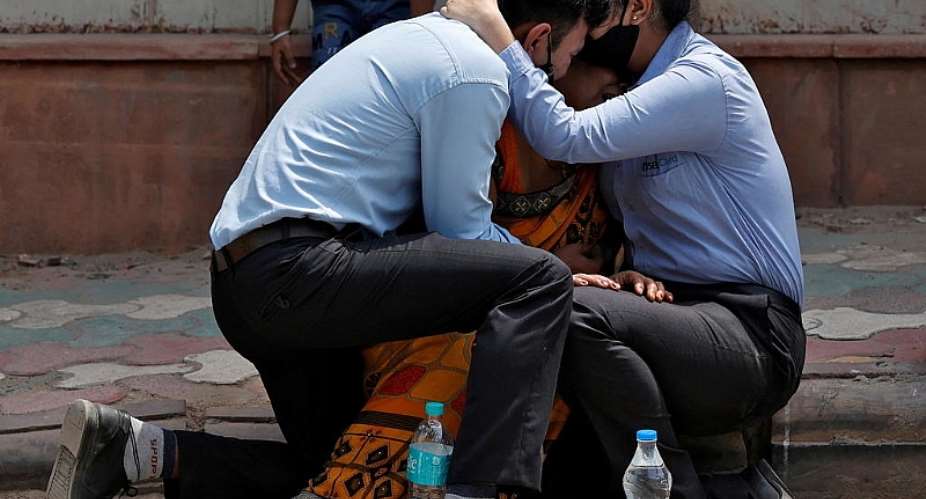A devastating second wave of the Covid-19 pandemic in India has led to a spike in mental distress and suicides with little in the way of social safety nets. Fear and anxiety has affected vast swathes of the population, cutting across age groups and class divisions. Health care professionals warn this will have long-lasting repercussions on society.
In India, the pandemic, which began last year, continues to impact on the mental and physical well-being of young and old people alike.
For youth, it is not only destroying their jobs and employment prospects, but also disrupting their education and training.
Uncertainty and fear caused by the surge in cases the past few months and the high number of fatalities have had a major impact on the mental health of senior citizens.
According to Agewell Foundation, an NGO, there has been an increase of over 50% among senior citizens when it came to such mental health disorders and symptoms of this stress include anxiety, sleeplessness, nightmares, depression as also weakness and fatigue.
Through its helpline and volunteers on the ground, conversations with around 5,000 people across the country in the past one month, showed around 63 percent of the elderly developed symptoms of depression because of loneliness and social isolation.
“People with pre-existing psychiatric conditions such as depression, schizophrenia, obsessive-compulsive disorders, and dementia have shown exacerbations at this point”, Agewell Foundation founder Himanshu Rath told RFI.
Not enough qualified counselors
Unfortunately, to deal with this high burden of mental health issues, there is a desperate need for a proportionate number of psychiatrists and counselors.
According to the Directorate General of Health Services, India has currently just about 9000 psychiatrists and about 700 graduate every year.
Going by this figure, India has just 0.75 psychiatrists for every 100,000 population, while the desirable number is anything above three.
Psychiatrists point out that the number of qualified grief counselors and those treating patients with evidence based interventions would not be more than 50 in the country.
“The pandemic will leave in its wake communities that will need to be rebuilt. We must remember that Covid-19 has a vaccine now, mental health has no vaccine in sight,”Achal Bhagat, Delhi's top psychiatrist told RFI.
Social stigma
The first step to recovery is recognition. Social stigma against mental health illnesses remains a major impediment and many still hesitate to seek help.
“Unfortunately, the mental health impact is worse this time and there is a universal sense of helplessness. What is also contributing is the stigma attached to those suffering from such problems,” Bhagat added.
- India promises to take care of Covid orphans amid child trafficking concerns
- India's vernacular reporters unearth devastating reality of Covid in rural areas
India has a large and yet often understated burden of mental illnesses. A Lancet study last year estimated that over 197 million people had mental disorders in India in 2017, including 45.7 million people with depressive disorders and 44.9 million with anxiety disorders.
Unfortunately, lack of mental health awareness and paucity of mental health experts have prevented thousands of patients from receiving medical help. Nowhere is this divide more critically pronounced than in smaller towns and rural India.
Suicide on the rise
The National Institute of Mental Health and Neurosciences identifies “anxiety about death and dying in unnatural circumstances without access to family and friends” as one of the primary psychological issues to emerge in this pandemic.
Even much before the pandemic, India's suicide mortality rate was the highest in the world reporting about 381 suicides daily for the year of 2019.
This number marked an increase of nearly 3.4 percent of suicide deaths compared to 2018, according to a report by the National Crime Records Bureau.
In the ongoing second wave that has gripped the country, suicide help lines across the country have been overwhelmed by calls from those whose lives have been upended or affected by the crisis.
“This underreported crisis has come to the fore. It will only lessen if we have proper community based care that can be provided at all levels,” said Nelson Vinod Moses of the Suicide Prevention India Foundation.
Psychiatrists believe a post-Covid landscape will be a fertile breeding ground for an increase in chronic stress, anxiety, depression, alcohol dependence, and self-harm. This is likely to have immense psycho-social offshoots that might far outlast the infection itself.





 Tuesday’s downpour destroys ceiling of Circuit Court '8' in Accra
Tuesday’s downpour destroys ceiling of Circuit Court '8' in Accra
 SOEs shouldn't compromise on ethical standards, accountability – Akufo-Addo
SOEs shouldn't compromise on ethical standards, accountability – Akufo-Addo
 Father of 2-year-old boy attacked by dog appeals for financial support
Father of 2-year-old boy attacked by dog appeals for financial support
 Jubilee House National Security Operative allegedly swindles businessman over sa...
Jubilee House National Security Operative allegedly swindles businessman over sa...
 Nobody can order dumsor timetable except Energy Minister – Osafo-Maafo
Nobody can order dumsor timetable except Energy Minister – Osafo-Maafo
 Mahama wishes National Chief Imam as he clock 105 years today
Mahama wishes National Chief Imam as he clock 105 years today
 J.B.Danquah Adu’s murder trial: Case adjourned to April 29
J.B.Danquah Adu’s murder trial: Case adjourned to April 29
 High Court issues arrest warrant for former MASLOC Boss
High Court issues arrest warrant for former MASLOC Boss
 Align academic curriculum with industry needs — Stanbic Bank Ghana CEO advocates
Align academic curriculum with industry needs — Stanbic Bank Ghana CEO advocates
 Election 2024: We'll declare the results and let Ghanaians know we've won - Manh...
Election 2024: We'll declare the results and let Ghanaians know we've won - Manh...
